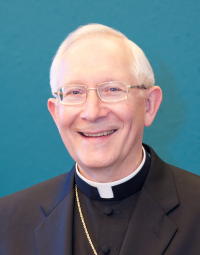
Archbishop Leonard P. Blair
A time of worldwide pandemic, with all the fears to which it gives rise, puts us all to the test — a test of our ability to cope with our fears, our medical and material needs and our very faith in God amid the suffering and dying of many.
There are many aspects to faith, but the one that is especially needed in our present circumstances is faith understood as trust.
The Old Testament emphasizes faith under this aspect of trust, epitomized in the figure of Abraham. Faith means accepting and believing the messages, promises and commandments of God as he did. Another way of putting it is to say that faith involves confidence in God, who is faithful and trustworthy. He is to be trusted without hesitation, doubt or fear. At the same time, the Bible also reveals faith as a movement of the intelligence toward realities that are not seen. The whole history of Israel is the story of a people being led by the hand of God. Their infidelity, which, at root, was a lack of trust, was denounced by the prophets, who recognized the true depths of human sinfulness and the need for God himself to create a trusting human heart in a new covenant yet to come. This was fulfilled with the advent of Christ.
The New Testament Letter to the Hebrews says, “Faith is the assurance of things hoped for, the conviction of things not seen.” On a personal level, this means that when the providence of God is not so apparent, and he seems distant or remote, we are being called to exercise faith on a deeper and purer level. A great saint, John of the Cross, teaches that this ever-increasing purification of faith is what most directly and most immediately unites us to God. The self-abandonment and the trust that faith entails are very pleasing to God, and bring us very close to him.
Jesus, in his sacred humanity, became one like us in all things, including temptation, but without sin. He was beset by weakness, but he put all his trust in his heavenly Father. Reflecting on this, Sister Ruth Burrows, OCD, writes: “We, like Jesus, have to shut our eyes, give up the controls, allow God to work and say, with Jesus, our ‘yes yes!’ Is thus that we cease to be in control by trying to be our own god, our own creator, and we accept, as he did, to be human: wholly contingent; with no answer, no fulfillment in ourselves; an emptiness that looks to infinite love for its completion. Because of Jesus we, too can learn obedience, learn to accept with all our hearts the painful but wonderful vocation to be human … This ‘yes’ of Jesus is that all-powerful word that upholds the universe, taking it to God.” (The Essence of Prayer, p. 207)
The need for trust in God also brings us face-to-face with his Church, not in the sins and failures of her members, which are all too evident and painful to see, but in her mystery as the body and bride of Christ. The visible, human rock on which Christ chose to “build his Church” was St. Peter, and it is not out of place to compare his faith to Abraham’s. In the Old Testament, the prophet Isaiah calls upon the people to “look to the rock from which you were hewn … look to Abraham your father.” (51:1-2) On account of his faith, Abraham, the father of believers, is seen as the rock that supports creation. And St. Peter, thanks to his profession of Christ as the “Son of the living God,” becomes the rock on which the Church is built, the rock that is to prevail against the destructive forces of evil until the end of time.
At a difficult time for the world, the Church and each of us individually, let us renew our faith under the aspect of trust — trust in God and his loving providence for each of us and for the world, and trust in the “way” he has revealed in and through his body and bride, the Church.
